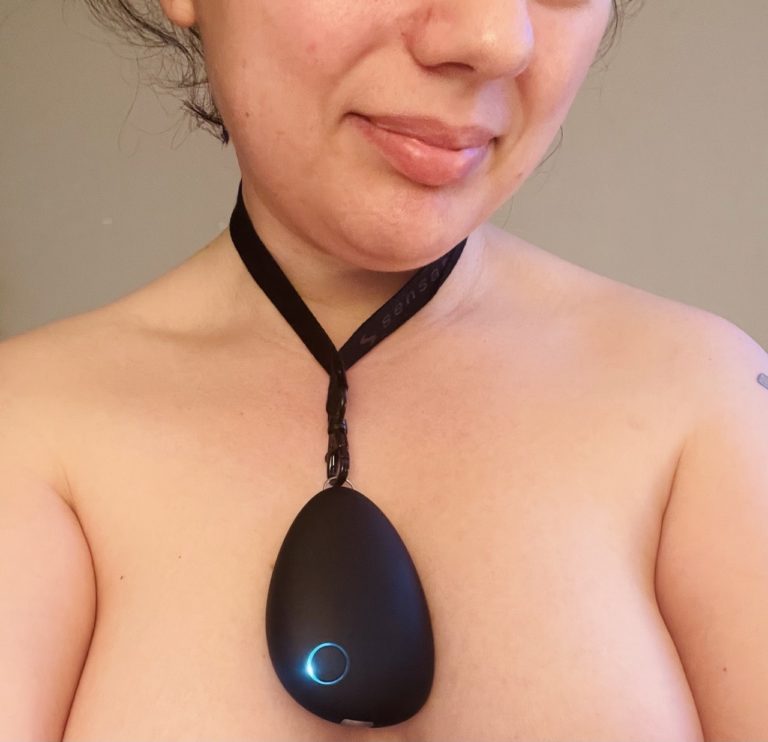
It’s not often that I’m offered a vibrating object which isn’t designed to be put on your genitals – so I was intrigued when I received a press release about the Sensate.
What is the Sensate and what does it do?
The Sensate is a “wearable stress relief and anti-anxiety device.” It’s a small vibrating object that reminds me of the Je Joue MiMi. It comes with a lanyard, which you can attach to it and then wear like a necklace, to keep the Sensate in the right spot on your sternum while you’re using it.
Okay, but what does the Sensate actually do? It connects via Bluetooth to an iOS/Android app, which contains a selection of ambient audio tracks for meditation. Each one of those tracks has its own corresponding vibration patterns, so that the vibrations you feel on your chest are perfectly in sync with the music or sounds you’re hearing.
This could be plenty relaxing on its own, but the Sensate’s vibration actually serves a specific purpose beyond just feeling good (which it does): to “tone the vagus nerve.” If you’re unfamiliar, the vagus nerve is the longest nerve in the human autonomic nervous system. It plays a role in many critical aspects of health, including heart rate, breathing rate, and digestion. It also helps us cope with stress, by regulating our fight-or-flight responses and helping us soothe ourselves back into a relaxed state when we get stressed out.
Supposedly, the vibrations meted out by the Sensate help the vagus nerve to relax, evoking a feeling of safety and calm. The makers of the Sensate say that over time, this process gets easier and easier as your vagus nerve gets more toned, so that you develop greater resilience in the face of stress.
(I should note here that while I minored in psychology in school, and have done extensive self-education on trauma and the nervous system, I’m not a medical expert at all and don’t have the knowledge or experience to directly confirm whether this science is legit. But everything I’ve written here is, to the best of my knowledge, true.)
How well does it work?
I’ve recently been learning about mindfulness and meditation for pain reduction, through a program offered by my local chronic pain clinic, so I was excited to get to test a device that’s specifically for meditation. I have to say, usually I struggle to make time for meditation because it just seems so boring compared to, I dunno, doomscrolling Twitter or playing Pokémon games… but since getting the Sensate, I’ve been much more enthused about it. There’s something about having a cool little device that makes the whole practice feel more fun and special to me, and if that’s what it takes to motivate myself into meditating, then so be it.
I like to cocoon myself in bed, plug my headphones into my phone, slip the Sensate’s lanyard over my head, get it positioned properly, and put a blindfold on before beginning my meditation. (The blindfold helps me a lot, because otherwise I would tend to look around idly and get distracted.) There are currently 13 different tracks in the app – I hope they add more eventually – and each has a duration of either 10, 20, or 30 minutes; I like that I can choose whichever duration I’m in the mood for, but do wish there were a few 5-minute meditations too, for those really busy days.
Like most beginner meditators (and maybe most meditators in general tbh), my mind wanders a lot while I’m trying to “empty” it during a meditation session. But I find that the vibrations of the Sensate are grounding and serve as a frequent reminder that I am indeed meditating, and that I should gently return my focus to my breath (or whatever else I’ve chosen to focus on).
I gotta say, I was skeptical about the Sensate, but I always notice a significant reduction in stress and agitation after I use it. My body and brain typically feel calm, quiet, and relaxed, in a way that reminds me of the soft peace I feel after a good hard cry or a good hard spanking scene. When I try to meditate without the Sensate, often I just end up worrying about work projects I have to finish or social interactions I think I fucked up, so I often don’t feel very relaxed by the time a meditation ends; however, with the Sensate, even if I do experience anxiety or worrying during the meditation, I always feel calmer when I’m done.
The battery life is pretty good; Sensate’s website says you’ll probably need to charge it once a week if you’re using it every day. It comes with a cute little travel case, which I love, because I genuinely would bring this with me on trips, especially if I was en route to an anxiety-provoking event.
I can’t really tell you whether the Sensate has had any kind of long-term effect on my overall mood or stress level, because I’m also going through a lot of stuff right now that is affecting those things too: trauma therapy, learning about Internal Family Systems, a fucking global pandemic, and so on. But I can say that it helps me relax in the moment, helps me fall asleep, and motivates me to meditate more often.
But is it sexy?!?
Look, this is a sex blog, and I wrote a book about kink. Of course I gotta talk about whether this thing is sexy and/or kinky.
There is a spot on my chest, right between my boobs, that feels good to touch, in a borderline-sexual way. I always adjust the Sensate so it is placed directly on that spot, even though the instructions recommend placing it a little higher. (They also say placing it lower is fine, FYI.) This makes it a more sensual experience for me and is probably a big part of why I feel more motivated to meditate since getting this device 😂
If you’re into erotic hypnosis, or have another kink that involves fetishizing relaxation, sleepiness, or spaceyness, I’m sure you could find some inventive ways to use the Sensate in scenes. For instance, I think it would be hot if my partner put me in trance, put my Sensate + headphones + blindfold on me, started a 30-minute track, and performed cunnilingus on my sleepy, spacey body. (Um, they’re gonna read this post aloud to me later like they always do, and I just know they’re gonna make some kind of pervy comment right here that’ll make me blush…)
I have considered the idea of placing the Sensate on my genitals during a meditation, but I just don’t know that it’d be all that fun. The vibrations aren’t toooo buzzy but they certainly aren’t optimized for genital pleasure. I think you’d be better off just using a regular vibrator on yourself during a Sensate session if you wanted to combine meditation with masturbation (or sex).
I tried using the Sensate during a shrooms trip once, and wished I had pre-vetted the track I chose, because it was kind of creepy and put me into a negative headspace in that state, so I abandoned ship after just a couple of minutes. I’d like to try it again with a different track sometime soon, because I’m sure it would be wild to use this thing on psychedelics.
Does it have any drawbacks?
The main one is that this thing costs $249. I imagine that a lot of the reason for that steep price tag is the research and development that went into creating it, which I absolutely respect; I just think it’s way out of most people’s price range for something they’ll probably use a few times a week, tops. If you’re a serious meditator, have a lot of cash to throw around, and/or have “tried everything” to relieve your stress symptoms and want to try something else, I think it’d be a decent purchase. But the average person definitely does not need this, especially since you can get the app for free and just listen to the audio tracks, sans vibration.
There’s no way to experience the relaxing vibrations of the Sensate without the usage of the accompanying app. This means that you’re shit outta luck if you don’t have an iOS or Android phone. It also means that you can’t sync up the Sensate with other audio, like your favorite songs or a voice memo of your partner saying filthy shit to you. You can use it without headphones on, thereby experiencing only the vibrations and being able to listen to whatever you want, but the inventors say (and I believe) that the relaxation effects won’t be as pronounced if you use it that way. Of course, if you’re using it for hypnokink perviness or somesuch, maybe you don’t care about that.
Final thoughts
If you can spare $249 and you want an inventive product that’ll help you chill out, I think you’d dig the Sensate. I’m honestly really glad I own one.
But also, you don’t need it. Maybe just try holding your vibrator against your chest while you meditate sometimes? 🤷🏻♀️
Thanks to Sensate for sending me their product to try! They didn’t pay me for this review or anything, I just think it’s a cool product and wanted to write about it.

